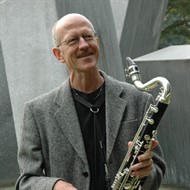| Country | Switzerland |
|---|
| Occupation | Composer, Performer |
|---|
| Categories | Contemporary, Electronic, Jazz, Minimalist, World |
|---|
Martin Schlumpf was born on December 3, 1947, in the Swiss town of Aarau, where he took his high school diploma in 1966.
During these years he played double bass and sometimes saxophone in various jazz groups. He also studied classical cello for eight years and tried his hand at the piano at irregular intervals.
A peak experience was his discovery of the music of Anton Webern, which inspired his earliest essays in composition.
In 1968 he began to study music in Zurich with the following areas of concentration:
Clarinet (Hansjürg Leuthold)
Piano (Warren Thew and Evelyne Dubourg)
Conducting (Ferdinand Leitner)
Theory and composition (Rudolf Kelterborn).
He took a teaching certificate in piano with Warren Thew in 1971 and completed his degree in music theory with Rudolf Kelterborn in 1972. Further studies in composition took him to Boris Blacher in Berlin in 1974.
Schlumpf then became a piano teacher at Küsnacht Seminar in Zurich (1975) and taught music at the Freudenberg High School in Zurich. Since 1977 he has been professor of music theory at the Zurich University of the Arts, where he has also taught group improvisation since 1991.
Until 1980 Schlumpf was mainly active as a composer of contemporary art music, winning awards at the Zurich Competition (first prize, 1972 and 1979) and the Tonhalle Competition (1975), among others.
Beginning in 1980 he returned to improvised music and started playing in a number of his own groups, at first as a bass player in Trio 80 (with Urs Blöchlinger), and from 1982 as a saxophone player and bass clarinetist in his eleven-piece band Swiss Fusion 84, the sextet Die Vögel ("The Birds"), and especially Bermuda Viereck ("Bermuda Rectangle").
Schlumpf has also taken part in other projects, including
a film music project with Christoph Baumann,
the Duck Dich Cabaret with Martin Hamburger,
the John Tchicai Orchestra,
the big band Notspielplatz Zürich
Urs Blöchlinger's international Cadavre Exquis Orchestra
the theater projects "Krötenaquarium" and "Attinghausen".
Since 1987 he has also played soprano saxophone in the Aargau Saxophone Quartet.
Since the late 1980s Schlumpf has been widely active in the borderlands between improvisation and composition. He has placed increasing emphasis on his work as a composer in a new "post-modern" style, producing such works as his cycle Vier Jahreszeiten ("Four Seasons"), the piano concerto Mouvements, a Trio for clarinet, cello and piano, Rattaplasma 2, and the cello concerto Waves.
Beginning in 1999 Schlumpf's interests increasingly incorporated the computer in his compositions with the aim of obtaining a larger range of timbres and complex polymetrical structures.
In 1999 he was commissioned by the Zurich Musikhochschule to arrange several of Conlon Nancarrow's "Studies" for computer sounds.
Today Schlumpf lives with his wife Antoinette in Würenlingen.
